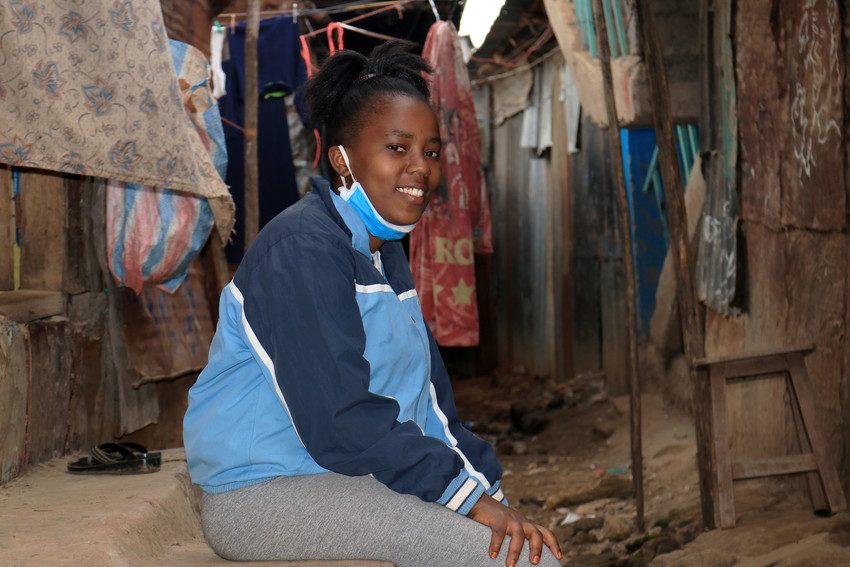Urban violence: Quit blaming the victims
21 June 2022We must start working with – not against – young people, blogs Morten Lynge, Head of Urban Programming, Documentation and Research, Plan International Denmark.

Jane, 19, is from an informal settlement in Nairobi where she takes part in Plan International's Safe and Inclusive Cities project.
When asked, most people will say that youth are responsible for violence. But we’ve interviewed more than 12.000 young people across cities in Ethiopia, Kenya, Uganda and Zimbabwe. They’re telling a different story.
In the major cities and towns, shocking numbers of young women and men have been exposed to violence. More than 1 in 3 have witnessed violence at home, in the street, in parks, in the bus or at the station during the past year alone. Girls and young women are more exposed than young men, but the streets aren’t safe for anyone. Here, young men are almost as exposed as young women.
We are just seeing the tip of the iceberg
Most violence and abuse is never reported. Juliet, from Kampala, Uganda, is a youth advocate in Plan International’s Safe and Inclusive Cities programme. Every day, she fights the harassment and abuse that have become ‘normal’ in Kampala’s public spaces. The worst part is that the abusers – often grown men – don’t even realise that what they are doing is wrong and the girls suffer in silence.
Juliet says: “I choose to rise against this physical abuse because as young women, we have had enough of the bad touches in the urban centres most especially in public spaces like markets, taxi and bus parks, boda boda stages, walkways and even around shopping malls.
“You are just girls,” they say. Do you know how it feels to be devalued in such a way? It is frustrating to say the least!”
If we don’t see it, we can’t change it
Violence is ugly. But we can’t close our eyes to it. If we want to fight it, we must bring it in to the light. Like Juliet in Kampala, Nicera from Nairobi, Kenya, dedicates most of her time to fighting violence in Kibera. She is a young activist and a media specialist in Slum Dwellers International, one of Plan International’s key partners in making cities safer for everyone. Together with hundreds of young activists and supported by dedicated experts, they have uncovered the violence and abuse that used to be in the shadows. This is exhausting work, but Nicera never regrets volunteering for it. They bring evidence to the local police and demand change. Before, they were afraid to demand their rights to safety and justice. They were even afraid to go to the police. Now, even though they spend much of their time mapping all the unsafe spaces in their communities, they feel safer than before.
Armed with evidence
Nicera and Juliet now have knowledge and evidence and they use it to take action and demand change from their peers, their neighbours and their local police officers. Armed with evidence, the police and local authorities now listen to them and take them seriously, where they used to discard them as troublemakers. As Angel, another youth advocate in Kampala, Uganda says: “Share your story; this can provide relief to a fellow girl from the previous experience and cleanse your mind. Let the world know that it’s not right and must be condemned. Share it at every opportunity to change the narrative”.
We must do that at all levels. We must dare to speak out. Also against popular belief when we know it to be wrong.
Young people are overwhelmingly the victims of urban violence, most perpetrators are adult men.
The primary reason for violence and abuse is not poverty or unemployment. It is the simple but devastating fact that in many cities around the world, violence and abuse – in particular sexual abuse and domestic violence against young women and girls and physical violence against young men – have become ‘normalised’. It has become almost a part of urban life. Something that decision-makers hardly even see. But we must never tolerate this! We must work with a diversity of young people to bring all the different forms of urban violence out of the shadows and out of our cities.
We have launched the Urban Research Series to provide ongoing analysis and learning from our extensive urban programming and influencing activities. The research will support the expansion and scale-up of urban work, enable innovative partnerships with external stakeholders, and support the realisation of the New Urban Agenda within the Sustainable Development Goals. Our Urban Research Series will initially produce four reports on violence prevention, civic participation, and employment and decent work opportunities using data from Plan International’s Safe and Inclusive Cities programme.
The Urban Research Series will be launched at the World Urban Forum at our hybrid event: “Inter-generational dialogue on urban fragility and resilience – evidence from the city” on Wednesday 29 June 2.30-4pm CET.
Morten Lynge is the Head of Urban Programming, Documentation and Research at Plan International Denmark. He is currently undertaking a PhD at the University of Aalborg, Denmark researching young people’s collective action and citizenship in contexts of urban violence and fragility.


